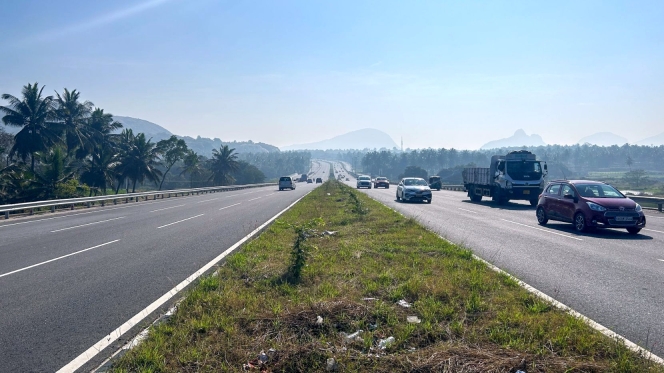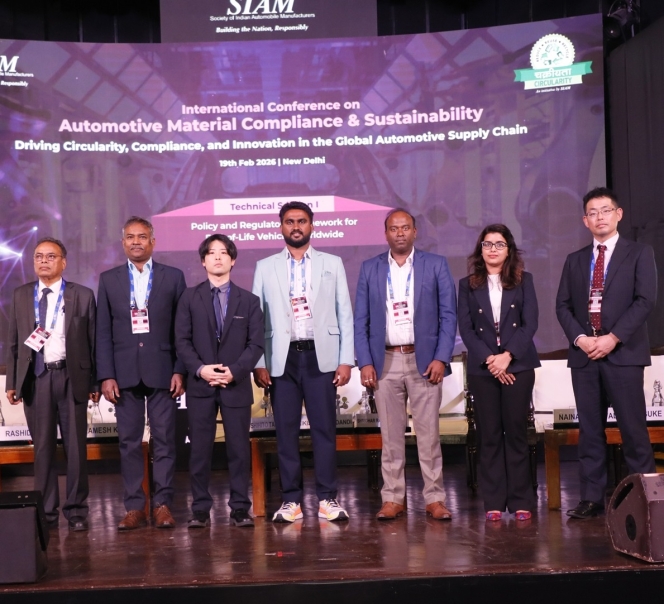Dip In Automobile Sales Not Alarming: CareEdge Ratings
- By Gaurav Nandi
- December 14, 2024

India’s automobile industry has witnessed a dip is sales number in the passenger and commercial vehicle segments in FY24 and H1FY25. However, experts from CareEdge Ratings opine that this dip is no alarming for the overall industry as it is a cyclical downturn and the industry will bounce back.
Commenting on the same during a virtual press conference, Senior Director Ranjan Sharma said, “The automobile sector has exhibited a mixed trend in H1FY25. While the two-wheeler industry has zoomed ahead at a healthy year-over-year growth rate of 16 percent, primarily driven by strong rural demand on the back of higher rural income levels, the passenger vehicle (PV) industry after witnessing healthy growth in past 2-3 years, has entered the slow lane during H1FY25 with wholesale volume growth slowing down to 2 percent on year-over-year basis due to subdued demand for entry-level cars and elevated inventory levels at dealer’s end. While two-wheeler volume growth is expected to remain healthy during FY25, overall PV volume growth is expected to continue to remain muted in FY25.”
“The commercial vehicle (CV) sector experienced significant growth post-pandemic, with approximately 30 percent growth in FY22 and FY23. FY22's growth was driven by a low base effect due to the pandemic's impact in FY21, while FY23 saw robust growth on a higher base. However, the momentum appears to have plateaued. Last year, the sector recorded a slight decline of around 1 percent and the current half-year shows a further decline of approximately 3 percent, primarily driven by a drop in the light commercial vehicle (LCV) segment. Meanwhile, the medium and heavy commercial vehicle (MHCV) segment has remained relatively stable,” he added.
He also noted that infrastructure spending and increased construction activity in the second half of the fiscal year, supported by heightened government investment, could lead to some improvement. Nevertheless, for FY25 as a whole, CV volumes are expected to remain in negative territory, with an estimated decline upto 3 percent.
Commenting on how the dip in sales will fare for the overall automobile industry, he stated, “The two-wheeler segment is performing well overall. However, major CV and PV players are doing well individually, though volume growth is expected to remain neutral for a year or two, as this is cyclical. The sectors witnessed such fluctuations every 2-3 years but there is no alarming concern for the overall sector. Moreover, there are no significant concerns from a credit quality standpoint. These companies are large, have diversified portfolios and maintain a strong financial risk profile.”
He added, “The PV sector witnessed significant growth in the past couple of years, driven by its cyclical nature. The growth rate for FY25 is projected to be around 3 percent with a similar trajectory expected for FY26. The LCV segment, being more price-sensitive, has been particularly affected, showing sharper declines. For FY25, the sector is expected to close with a decline of about -1.5 percent to -2 percent. Looking ahead to FY26, even under the best-case scenario, growth is likely to remain subdued, with only minimal improvements expected, driven by the same underlying factors.”
Alluding to the performance of the electric vehicle (EV) segment, he said, “EV volumes have shown healthy growth, particularly in two-wheelers and e-buses. However, this growth has come from a very low base. Even in FY24, EV penetration remains modest with two-wheelers at approximately 5.4 percent and other segments, including passenger and commercial vehicles, at around 2 percent each. The slower pace of growth and penetration can be attributed to challenges such as underdeveloped EV charging infrastructure and the high cost of EVs compared to internal combustion engine (ICE) vehicles, which continue to act as significant bottlenecks.”
Image for representative purpose only.
Defender Launches India’s First Luxury Automotive Anamorphic Display
- By MT Bureau
- February 20, 2026

Tata Motors-owned British brand Defender has become the first luxury automotive brand in India to launch an anamorphic display. The installation is located at the Phoenix Palladium in Mumbai from 20–22 February 2026. Following the Mumbai launch, the display will move to Delhi, Gurgaon, Bangalore, Kochi and Chennai.
The 35 x 16 feet screen uses anamorphic effects to create a 3D visual experience where the vehicle appears to emerge from the display. The content was produced in collaboration with Inventech, a Laqshya Media Group company.
The activation marks a shift toward digital storytelling within the Indian luxury automotive sector. By utilising forced perspective, the display aims to visualise the vehicle’s design and presence without physical hardware.
Rajan Amba, Managing Director, Jaguar Land Rover India, said, “Defender has a tremendous following and aspirational value in India stemming from its iconic heritage and off-road legacy that continues to inspire admiration across generations. Bringing India’s first luxury automotive anamorphic display to life is a natural extension of this legacy.”
Mark Cameron, Managing Director, Defender, said, “This activation is not merely a showcase of an iconic 4x4; it’s a statement of how innovation, creativity and experiential storytelling can converge to redefine engagement in luxury automotive. Through initiatives like this, we aim to inspire, captivate and connect with our audience in ways that reflect the unmatched capability, vision and spirit of Defender.”
- Society of Indian Automobile Manufacturers
- SIAM
- SIAM Sustainability Week 2026
- International Conference on Automotive Material Compliance & Sustainability
- AMCS
SIAM Hosts Inaugural International Conference On Automotive Material Compliance & Sustainability As Sustainability Week 2026 Concludes
- By MT Bureau
- February 20, 2026

The Society of Indian Automobile Manufacturers (SIAM) concluded its four-day Sustainability Week 2026 by hosting the inaugural International Conference on Automotive Material Compliance & Sustainability (AMCS) at the India Habitat Centre in New Delhi. The event convened global regulators, industry leaders, technology experts and policymakers under the theme ‘Driving Circularity, Compliance and Innovation in the Global Automotive Supply Chain'.
The opening session, ‘India's Transition towards Sustainable Mobility & Material Compliance’, was addressed by SIAM Executive Director Prashant K Banerjee, who emphasised India's role as the world's third-largest auto industry in advancing sustainable mobility through global safety standards and circular economy principles. He noted that compliance with the End-of-Life Vehicles Rules 2025 strengthens structured vehicle scrappage and resource recovery. During this session, a context paper titled ‘Strengthening Automotive Material Compliance Across the Vehicle Value Chain’ was released.
Jaywant Hardikar, Senior Advisor at ICAT, addressed attendees by framing sustainable mobility as a legacy for future generations. He called for circularity in product life cycles, strong linkages between vehicle end-of-life and material reuse and quantifiable targets such as sustainability indexes or digital product passports for every vehicle. Hardikar emphasised that government-registered scrapping facilities would play key roles in ensuring proper material segregation from the design stage onward.
Sanjeev Jain, Director of Purchase at Honda Motorcycle & Scooter India, shared insights on India's journey towards global green mobility leadership through circular economy principles and resilient supply chains. He pointed to policy measures including Extended Producer Responsibility mandates, vehicle scrappage norms and CAFE standards as key drivers for achieving 45 percent reduction in carbon intensity by 2030 through clean technologies including flex fuels, electric vehicles, charging networks, green logistics and green hydrogen.
Frank Nottebom, Account Delivery Executive for IMDS & CDX at DXC Technology, highlighted India's strategic importance for the International Material Data System, noting that active Indian users had grown from 3,600 to 21,000 in 2025. Hanno Focken, Managing Director of Catena-X, discussed global automotive value chain complexity and advocated for open, neutral and industry-governed solutions as India positions itself as a central link in global digital automotive supply chains. Dr Prabhakar Bhangare, CEO of Global PCCS, delivered the vote of thanks, emphasising shared commitment between manufacturers and service providers towards zero pollution goals.
The first technical session focused on ‘Policy and Regulatory Framework for End-of-Life Vehicles Worldwide’, moderated by SIAM Senior Advisor Dr Rashid Hasan. Dr A Ramesh Kumar, Principal Scientist at CSIR-NEERI, explained that Persistent Organic Pollutants are regulated under the Stockholm Convention requiring controls on 37 listed substances. International presentations followed from Europe delivered by Naina Agrawal of Marelli representing CLEPA and SaiKishore Uddandi of Joison Safety System representing CLEPA. From United States, Shridhar Rajappanavar of Key Sustainability represented AIAG. From Japan, Yoshihito Tanaka and Yosuke Miyake represented JAPIA.
The second technical session addressed ‘Digital Transformation in Supply Chain Transparency’, chaired by Frank Nottebom. Key presentations included Asmita Sathaye of Tata Motors on IMDS data best practices, Muthukumar N of Ashok Leyland on IMDS data accuracy and Hanno Focken on building digital ecosystems. Anja Lang of BMW Group and Shanawaz Sheik addressed product carbon footprint integration in IMDS. Deepti Kapil, Additional Director at CPCB, provided insights on end-of-life vehicle management guidelines.
The third technical session featured a panel discussion on ‘Overcoming Product Compliance Challenges in OEMs & Component Manufacturers’. Dr Prabhakar Bhangare served as moderator, delivering a context presentation on IMDS adoption levels and supplier maturity in India. Martin Eichhorn of DXC Technology addressed the session. The panel included Auto OEM representatives Arun Kumar of TVS Motor Company and Paurnima Barwe of Volvo. Auto Component Manufacturers were represented by Dr Naveen Verma of DENSO, Deepak Patil of Uno Minda and Sharad Raut of Southco. Sri Vinnakota of APA Engineering represented allied industries, concluding the four-day Sustainability Week 2026.
Delhi-Based EV Startup Pluto Mobility Raises $2 Million For Last-Mile Delivery Push
- By MT Bureau
- February 19, 2026

Pluto Mobility, a Delhi-based electric mobility startup focused on last-mile logistics, has just closed a seed funding round at USD 2 million. The investment was steered by Version One Ventures, with Grad Capital also contributing. Notably, the round drew interest from founders and senior figures at companies like Delhivery, OfBusiness, Pixxel and Boom Supersonic, signalling strong vote of confidence from within the logistics and tech ecosystems.
The startup was launched by Akshat Bhatia and Himanshu Panda with a specific mission: to design electric vehicles from the ground up for the rigors of Indian urban logistics. Rather than adapting existing two-wheelers, they are building something purpose-built. The funds will go towards sharpening their engineering focus, growing their team and setting up pilot runs in key city markets.
What sets Pluto apart is its vehicle design. It is roughly the size of a scooter but fully enclosed, offering protection against rain and heat. More importantly, it can accommodate twice the number of parcels per trip compared to a standard two-wheeler. That efficiency gain is not accidental. The founders have rethought everything – from chassis layout to cargo space – based on how delivery agents actually work. The result is a vehicle that boosts throughput without asking operators to compromise on safety or manoeuvrability.
This matters because most delivery fleets today still run on vehicles built for personal commute. They are not equipped for the stop-start, high-volume nature of e-commerce or quick-commerce deliveries. Operators often end up overloading bikes or switching to bulkier vehicles that cannot navigate narrow lanes. Pluto aims to fill that gap with a solution that is compact, durable and weather-resistant.
Pilot deployments are scheduled to begin later this year, with a focus on quick-commerce and e-commerce players looking for smarter ways to move goods through crowded cities.
Akshat Bhatia, CEO, Pluto Mobility, said, “India’s last-mile challenge isn’t speed, incentives or apps. It’s that delivery operations are built on vehicles never designed for delivery workloads. That mismatch caps how much can be moved per trip, increases failures at scale and quietly affects delivery economics.”
Boris Wertz, Founding Partner, Version One Ventures, said, “Pluto Mobility is taking a fundamentally different approach to last-mile delivery by designing vehicles specifically for throughput and operational reliability.”
- Andreas Mindt
- Volkswagen
- Volkswagen Group
- Michael Mauer
- Bentley Design
- Volkswagen Passenger Cars
- Porsche
- Oliver Blume
Andreas Mindt Succeeds Michael Mauer As Volkswagen Group Design Head
- By MT Bureau
- February 19, 2026

Andreas Mindt, Head of Design for the Volkswagen brand, has been appointed to lead Group Design for the Volkswagen Group, effective 1 March 2026. He succeeds Michael Mauer, who is departing as part of a transition.
He will hold this role alongside his current position at the Volkswagen brand. His appointment follows Mauer’s previous handover of responsibilities at Porsche to a successor.
Andreas Mindt joined the Volkswagen Group in 1996. His career includes work on the first-generation Tiguan and the Golf 7. Between 2014 and 2021, he led exterior design at Audi, overseeing models from the A1 to the e-tron GT. He later served as Director of Bentley Design, where he developed the design language for the Bentley Batur, before becoming Head of Design for Volkswagen Passenger Cars in 2023.
Michael Mauer joined the Group in 2004 as Head of Design at Porsche. During his tenure, he oversaw the Cayenne revision, the Panamera, and the 918 Spyder. He has served as Head of Group Design since January 2023, focused on establishing brand identities across the portfolio.
The role of Group Design is to differentiate the various brands within the Volkswagen Group by defining their specific identities. The strategy focuses on making each brand recognisable while ensuring products meet regional market requirements and customer expectations.
Oliver Blume, CEO, Volkswagen Group, said, “I would like to warmly thank Michael Mauer for his outstanding work and for the close and collaborative working relationship over the years. He shaped an era at Porsche. As Head of Group Design he also established a design philosophy across all brands that provides orientation and ensures recognition – with clearly defined brand and product identities. His work has shaped the style of our brands and will remain visible in the future.”
“I am looking forward to working more closely with Andy Mindt. With his track record at the Volkswagen brand and his expertise, he has made a significant impact in a short time and played a key role in ensuring that our cars are clearly recognisable as genuine Volkswagen models again,” added Blume.






Comments (0)
ADD COMMENT